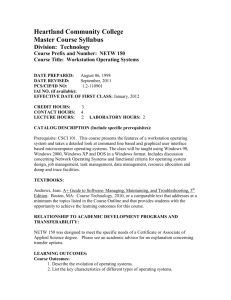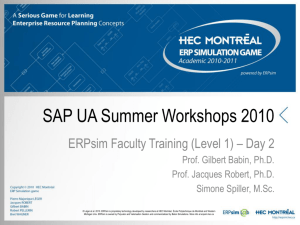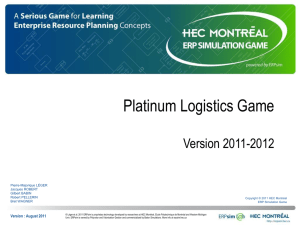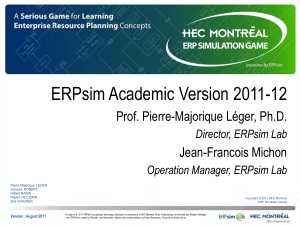IDS 406 Syllabus - San Diego State University
advertisement
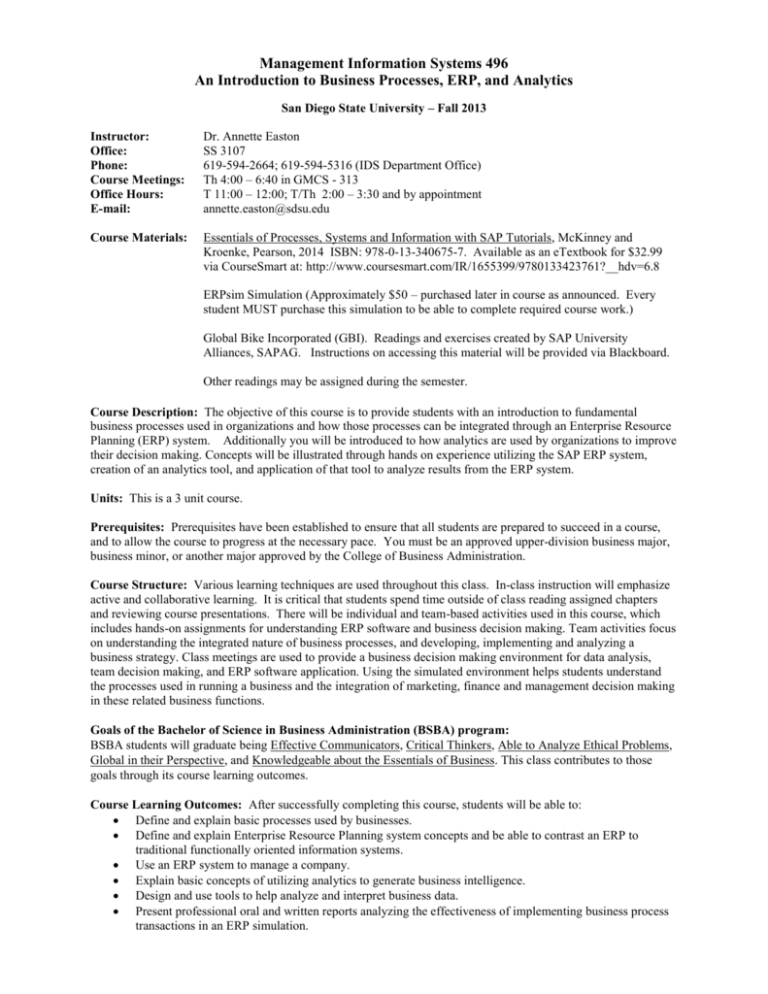
Management Information Systems 496 An Introduction to Business Processes, ERP, and Analytics San Diego State University – Fall 2013 Instructor: Office: Phone: Course Meetings: Office Hours: E-mail: Dr. Annette Easton SS 3107 619-594-2664; 619-594-5316 (IDS Department Office) Th 4:00 – 6:40 in GMCS - 313 T 11:00 – 12:00; T/Th 2:00 – 3:30 and by appointment annette.easton@sdsu.edu Course Materials: Essentials of Processes, Systems and Information with SAP Tutorials, McKinney and Kroenke, Pearson, 2014 ISBN: 978-0-13-340675-7. Available as an eTextbook for $32.99 via CourseSmart at: http://www.coursesmart.com/IR/1655399/9780133423761?__hdv=6.8 ERPsim Simulation (Approximately $50 – purchased later in course as announced. Every student MUST purchase this simulation to be able to complete required course work.) Global Bike Incorporated (GBI). Readings and exercises created by SAP University Alliances, SAPAG. Instructions on accessing this material will be provided via Blackboard. Other readings may be assigned during the semester. Course Description: The objective of this course is to provide students with an introduction to fundamental business processes used in organizations and how those processes can be integrated through an Enterprise Resource Planning (ERP) system. Additionally you will be introduced to how analytics are used by organizations to improve their decision making. Concepts will be illustrated through hands on experience utilizing the SAP ERP system, creation of an analytics tool, and application of that tool to analyze results from the ERP system. Units: This is a 3 unit course. Prerequisites: Prerequisites have been established to ensure that all students are prepared to succeed in a course, and to allow the course to progress at the necessary pace. You must be an approved upper-division business major, business minor, or another major approved by the College of Business Administration. Course Structure: Various learning techniques are used throughout this class. In-class instruction will emphasize active and collaborative learning. It is critical that students spend time outside of class reading assigned chapters and reviewing course presentations. There will be individual and team-based activities used in this course, which includes hands-on assignments for understanding ERP software and business decision making. Team activities focus on understanding the integrated nature of business processes, and developing, implementing and analyzing a business strategy. Class meetings are used to provide a business decision making environment for data analysis, team decision making, and ERP software application. Using the simulated environment helps students understand the processes used in running a business and the integration of marketing, finance and management decision making in these related business functions. Goals of the Bachelor of Science in Business Administration (BSBA) program: BSBA students will graduate being Effective Communicators, Critical Thinkers, Able to Analyze Ethical Problems, Global in their Perspective, and Knowledgeable about the Essentials of Business. This class contributes to those goals through its course learning outcomes. Course Learning Outcomes: After successfully completing this course, students will be able to: Define and explain basic processes used by businesses. Define and explain Enterprise Resource Planning system concepts and be able to contrast an ERP to traditional functionally oriented information systems. Use an ERP system to manage a company. Explain basic concepts of utilizing analytics to generate business intelligence. Design and use tools to help analyze and interpret business data. Present professional oral and written reports analyzing the effectiveness of implementing business process transactions in an ERP simulation. Grade Policy and Standards: University grading policy SDSU Policy File: Grades 1.0 states “…instructors shall use all grades from A through F to distinguish among levels of academic accomplishment. The grade for average undergraduate achievement shall be C;...” The University-wide grading standards will be used to determine your final course grade. The following percentage ranges will be used for assigning grades (plus/minus grades will be assigned): A (90-100%), B (80-89%), C (70-79%), D (60-69%), F (<60%) Grading and Course Requirements: Assessment of your learning will occur through a variety of mechanisms including in-class exercises, participation, homework assignments, exams, and a class project. Quizzes/Exams. There will be a variety of quizzes during the semester covering different topics from the assigned readings. The Midterm exam will assess your individual knowledge of the business processes, ERP and analytics concepts taught in the course. You will not be able to successfully pass the quizzes and exams unless you have kept up with the readings, class discussions, homework, and project assignments. The shortanswer or problem-base exam questions will require you to recall, understand and to apply the material, not simply pick memorized answers from a list. You must be able to demonstrate that you understand the concepts. Assignments. There will be several homework assignments during the semester. Late assignments are not accepted. The requirements and due dates for each assignment will be provided in separate handouts throughout the semester, or will be posted on the class blackboard site. There may be in-class assignments. Participation. Class participation is based both on attendance, completing in-class assignments and contributions to class discussion. Due to the nature of the class structure, you are expected to complete reading assignments prior to each class and to be prepared to discuss the assigned material. A portion of this grade is based on the Blackboard photo assignment. You must upload (no later than the second class period) a recent photograph of you into the Blackboard photo assignment for this course. If you need a suitable photo, please let me know and I will be happy to take a picture of you! Class Project. The group project provides hands-on experience with running a business using a real-life ERP system. In the project, your team will develop and document the business strategy plan you will implement while using the ERP simulation. You will also develop an analytics dashboard to help you analyze company and industry data during the simulation. Finally you will be required to write a report that summarizes the key elements of your strategy, analyzes the effectiveness of your business strategy, and discusses important lessons learned from the simulation. Project milestones will be due throughout the semester. Additional details on the project components will be provided in a separate handout later in the semester. Grading Standards (subject to minor changes): Quizzes/Exams Quizzes Quizzes/Exams Midterm Exam Assignments Full Cash-to-Cash Cycle Assignment Assignments Current Topic Presentation Participation Participation/In-Class Work Project Company Business Strategy Project Analytics Tool Project ERPsim Final Project Final Report/Presentation 15% 25% 5% 10% 5% 10% 10% 10% 10% Course Policies: All work in this class must be completed on an individual basis, unless otherwise noted. Cheating on exams and other assignments will not be tolerated and will result in an “F” in the course. Cheating will be defined as the effort to give or receive help on any graded work in this class without permission from the instructor, cheating during exams (including obtaining advance knowledge of test questions), submitting alterations to graded work for regarding, and plagiarism. All cases of cheating will be reported to SDSU’s Center for Student Rights and Responsibilities for University disciplinary action. Exception to these policies will be considered only in cases where a serious and compelling reason exists. Written documentation will be required. MIS 496 Fall 2013 Page 2 Tentative Course Schedule Week Date Topic Course Introduction MIS and Organizational Strategy Chapters 1 08/29 2 09/05 Introduction to SAP ERPsim – Distribution Business Process Overview Using IS to Improve Processes McKinney - 1 McKinney - 2 3 09/12 Supporting Processes with ERP Systems McKinney - 3 4 09/19 ERPsim – Logistics Intro Version 5 09/26 6 Assignments Paper Company Exercise ERPsim Logistics Role Based Booklets Cash-to-cash Assignment Understanding Procurement McKinney – 4 and Appendix 4 SAP Procurement 10/03 Understanding the Sales Process McKinney – 5 and Appendix 5 SAP Sales 7 10/10 Business Intelligence and Analytics 8 10/17 Integrating BI with ERPsim; Building Dashboards 9 10/24 Current Topic Presentations 10 10/31 ERPsim – Logistics Extended 11 11/07 Midterm Exam 12 11/14 ERPsim – Logistics Extended – Second Iteration 13 11/21 ERPsim – Logistics Extended – Final Iteration 14 11/28 Happy Thanksgiving 15 12/05 Analysis and Preparation of Final Report/Presentation Final 12/12 4-6 Business Strategy Due ERPsim – Designing Dashboards Analytics Tool Due ERPsim Logistics Participant Guide Board of Directors Final Report/Presentation ERPsim Final Executive Briefing to Board and Final Summary Report Please note that the Final Exam period for the class is on Thursday 12/12/13 from 4:00 – 6:00. Instead of a traditional final exam, you will be responsible for delivering and presenting your Final Report on your team’s strategy and performance during the ERPsim Logistics Final. Failure to attend and participate in the Final Report will result in zero points being assigned for the entire project grade. MIS 496 Fall 2013 Page 3




